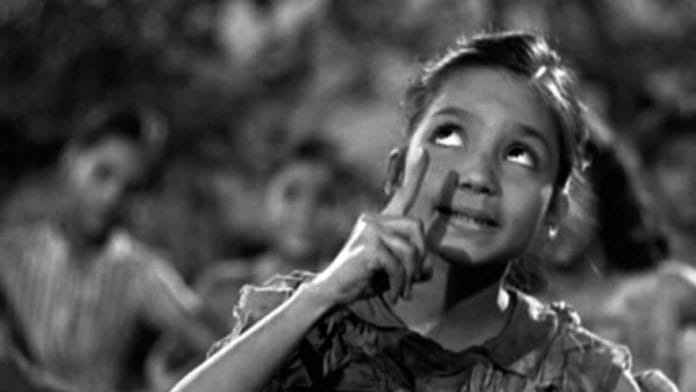Children are often a powerful vehicle to propel plots around poverty. Critically acclaimed movies like Fernando Meirelles’ City of God (2002) on hopes and dreams and violence in Rio to Danny Boyle’s Slumdog Millionaire (2008) that unfolds in the streets of Mumbai shows how this portrayal of urban poverty adapts and evolves with time.
In the Bollywood of the 1950s, it’s a recurring theme in films like Guru Dutt’s Baazi (1951) and Zia Sarhadi’s Footpath (1953). But Raj Kapoor’s productions were in a different league altogether. Awaara (1951), which he produced and directed, shows how criminals are not born but are created in the slums of modern cities. With Boot Polish (1954), he revealed the underbelly of the organised begging industry.
While it was billed as a comedy-drama, Boot Polish was also a critical view of a newly independent India that was consistently failing her people—and her children.
“The purpose of this film is to bring home to you that these orphans are as much your responsibility as that of the government. Individual charity will not solve this problem because the only solution is a cooperative effort on a national scale,” said Raj Kapoor in The Indian Express on 2 April 1954 titled, ‘Why I Produced Boot Polish’.
A simple plot
Directed by Prakash Arora and released in 1954, Boot Polish tells the touching story of two orphaned siblings and their journey from destitution to dignity. The simplistic plot rode on the shoulders of two child actors — Ratan Kumar played Bhola, and Kumari Naaz played Belu — who live with their wicked aunt, Kamla Devi (Chand Burke).
From the very start, the film hammers home the cycle of poverty and humiliation, and the harsh realities of street life. Kamla forces the children to beg. She controls every aspect of their lives including whether they get to eat or not. But when Bhola spots a man earning money by polishing shoes on a train, he realises that there is more to life than begging. He wants to be a boot polisher.
What saves this movie is the chemistry between the two actors and a script that focuses on their light-hearted shenanigans in the backdrop of all the beatings they have to endure. They give the audience a much-needed breather—even when they go to bed hungry.
The siblings have a friend in the form of John Chacha (played by David Abraham Cheulkar), a bootlegger who sells alcohol. He motivates them to earn money without compromising on their integrity. And, their ‘Boot Polish’ business comes into action.
Without any experience in polishing shoes, Bhola and Belu’s hilarious attempts leave the audience in splits. There is innocent idealism in the film—perhaps a reflection of a new India. The children are empowered to make their own decisions and earn a living without their agency being taken away from them.
Also read: Parinda introduced gritty realism to Bollywood. A fire on the set injured Nana Patekar
Bhola and Belu: the stars of the show
Their new boot polish business is doing well—until the monsoon starts. They have no option but to beg on the streets again. In a significant scene, Belu is shivering with a fever and hasn’t had food for days. She is ready to beg again. When a passerby hands her a coin, Bhola slaps her for resorting to begging. Defending her action, a crying Belu says “Kya karoon? Mujhe bhookh lag rahi hai (What do I do? I feel hungry).”
But their relationship is tested when Belu is adopted by a wealthy family. And for the first time in their lives, the siblings are separated. Tragedy upon tragedy seems to befall Bhola. He’s briefly arrested, has no means to support himself, and is forced to go back to begging. And that’s when he sees his sister again with her wealthy family. Given the underlying optimism of the movie, there is a happy ending where the siblings are reunited.
In an era where almost all Hindi films had adult characters as protagonists, Boot Polish stands out. The real stars in the film were Bhola and Belu.
Naaz steals the show as Belu. She even won a special mention at the Cannes Film Festival that year. It’s hard to accept that she was only about eight years old when she acted in the film.
Also read: A courtesan without shame or guilt—1966 film ‘Amrapali’ gave us a proud, powerful heroine
Ghost-directed by Raj Kapoor
Prakash Arora’s direction shines as he meticulously captures the emotional depth of the children’s journey. Boot Polish also left Bollywood with some memorable classics like Nanhe Munne Bachche Teri Mutthi Mein Kya Hai, Hum Matwaale Polish Waale, and Raat Gayi Phir Din Aata Hai.
But many reports have time and again surfaced suggesting that it was producer Raj Kapoor who “ghost-directed” the film. In an interview with rediff.com in 2013, Kapoor’s son and actor Rishi Kapoor had explicitly said that his father “was not happy with the way it was coming along.”
It is said that the original cut of Boot Polish did not feature any songs. Learning from the failure of his previous production, Aah, Kapoor refrained from taking the risk again. He, then, on a short notice assigned the composer duo Shankar-Jaikishan to create a soundtrack.
It’s not that Boot Polish is perfect—there are jarring notes. The scenes where John Chacha was in jail seemed extraneous to the plot. Although the song Lapak Jhapak Tu Aa Re Badarwa was popular. The setting and backdrop didn’t fit well in the storyline. It was as if the makers were looking for an excuse to plug in the track.
The last half-hour of the film with its happy coincidences seems unrealistic now. But perhaps in the India of the 1950s, the forgotten children, too, dared to dream.
(Edited by Aamaan Alam Khan)






